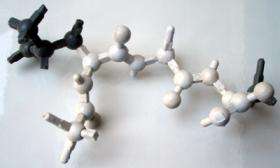Peptides-on-demand: Researcher's radical new green chemistry makes the impossible possible

(PhysOrg.com) -- McGill University chemistry professor Chao-Jun (C.J.) Li is known as one of the world leading pioneers in green chemistry, an entirely new approach to the science which eschews the use of toxic, petrochemical-based solvents in favour of basic substances like water and new ways of making molecules.
The environmental benefits of the green approach are obvious and significant, but following the road less travelled is also paying off in purely scientific terms. With these alternative methods, Li and his colleagues have discovered an entirely new way of synthesizing peptides using simple reagents, a process that would be impossible in classical chemistry. Their results will be published Feb. 27 in the online edition of the Proceedings of the National Academy of Sciences (PNAS).
Peptides are short oligomer and polymer substances made up of two or more amino acids linked in a chain. Proteins - also known as polypeptides - are themselves composed of longer chains of peptides. Peptides are enormously important to biological and proteomic research, but classical chemistry provides no easy way to synthesize them, making the potential impact of this discovery very significant.
"Currently, to generate peptides you must use a peptide synthesizer, an expensive piece of high-tech equipment," explained Li, Canada Research Chair in Green Chemistry. "You need to purchase every single separate amino acid unit that makes up the peptide, and feed them into the machine one by one, which then assembles them. Every time you need a new peptide, you need to synthesize it individually from scratch."
Li's new process, by contrast, allows researchers to construct a single, simple "skeleton" peptide which can be modified into any other peptide needed with the addition of a simple reagent.
"If you want to make one peptide or 20 or even 100, you just use a different reagent each time," Li said. "If you use 20 different reagents, you get 20 different peptides."
"This could never have been discovered using the classical form of chemistry," he continued. "Every amino acid unit is very similar to every other one, and classical chemistry simply cannot differentiate one from the other."
The new method is considerably less expensive than traditional techniques, and can readily be adopted by labs anywhere in the world, Li said.
"This is really an enabling new technology," he added, "and since McGill has decided not to patent it, we're making our method available to everyone. We are paying the journal's open access fee, so anyone in the world can access the paper."
Source: McGill University





















